Annual Academic Calendar of Madrasah for Session, 2023
WEST BENGAL BOARD OF MADRASAH EDUCATION
Maulana Abul Kalam Azad Bhawan
DD-45, Sector-I, Salt Lake City, Kolkata-70006
Memo No. 1915/Aca/22 Date: 30/12/2022
From: The Secretary
West Bengal Board of Madrasah Education
To: The Heads/ Superintendents/ TICs of all types of recognized Madrasahs
Sub: Annual Academic Calendar for the Academic Session 2023
Sir/ Madam,
I am directed to inform you that the annual academic calendar for the academic session-2023 has been prepared for smooth functioning of day to day academic and administrative activities of all recognized Madrasahs.
The same has been attached herewith for your ready reference.
You are requested to implement this Annual Academic Calendar for the Academic Session 2023.
Sd/- Secretary
West Bengal Board of Madrasah Education
Memo No. 1915/Aca/22 Date: 30/12/2022
Annual Academic Calendar-2023
(1) Academic Session:
01 January, 2023 to 31 December, 2023
The Session will be divided into three (3) Terms as follows:
i) First Term: 01 January, 2023 to 30 April. 2023 (including 1st Summative Evaluation) Preparation of Report Card & Publication of Results etc.)
ii) Second Term: 01 May, 2023 to 31 August, 2023 (including 2nd Summative Evaluation, Preparation of Report Card & Publication of Results etc.)
iii) Third Term: 01 September, 2023 to 31 December, 2023 (including 3rd Summative Evaluation, Preparation of Report Card & Publication of Results etc.)
(2)Timings of Madrasah hours:
Monday to Friday : 10.35 a.m. to 4.30 p.m.
Saturday: 10.35 a.m. to 2.00 p.m.
(3) Daily Assembly:
Daily Assembly shall start at 10 (ten) minutes before class teaching (10.50 a.m.) i.e. at 10.40 a.m. Attendance in daily assembly is mandatory for all teaching and non-teaching staff including the Head of the Madrasah.
(4) Attendance:
Head of the Madrasah and all teaching & non-teaching staff of the Madrasah shall attend the Madrasah within the appointed hour (10.35 a.m.) and not leave before the Madrasah closes for the day. The appointed hour of the Madrasah shall be 15 (fifteen) minutes before the commencement of the class teaching (10.50 a.m.) i.e. at 10.35 a.m.
(5) Late Attendance:
Late attendance shall be counted for all teaching & non-teaching staff of the Madrasah from 10.50 a.m up to 11.05 a.m. & no teaching and non-teaching staff including Head of the Madrasah will be allowed to record his/her attendance after 11.05 a.m. However, in very special circumstances, Head of the Madrasah (In case of teacher & non-teaching staff) or Secretary/ Administrator (in case of Head of the Madrasah) may condone such late attendance of the staff, if the said authority is satisfied with the explanation offered by the employee. One day’s casual leave will be deducted for every three days late attendance in a calendar month. In case the casual leave account of the staff is exhausted and the incumbent concerned comes late, he/she shall be asked to apply for one day’s “Half average pay” leave for each three day’s late attendance in a calendar month. If he/she fails or declines to apply for such leave or if there is no such leave in his/her credit then he/she will be granted “Leave without pay” leave for each three day’s late attendance in a calendar month.
(6) Departure :
On no account, can the teaching and non-teaching staff leave the Madrasah premises before 4.30 p.m.
(7) Tiffin or Recess:
40 minutes shall be earmarked for Tiffin or Recess from Monday to Thursday. 60 minutes shall be allotted for Recess/ Prayer for Friday.
(8) The Head of the Madrasah shall be responsible for overall academic and administrative matters of the Madrasah
(9) During temporary vacancy of the Head of the Madrasah (Head Master/ Head Mistress/ Superintendent) the Assistant Head Master/ Assistant Head Mistress/ Assistant Superintendent shall officiate the post of Head of the Madrasah, no other Teacher is required to be appointed as Teacher In Charge( TIC) in the said Madrasah. In case of non availability of Assistant Head Master/ Assistant Head Mistress/ Assistant Superintendent, TIC will officiate the post of Head of Madrasah.
(10) All academic works/ activities including seminar, workshop, meeting etc. conducted by the Board and other duties relating to the improvement of Madrasah Education should be treated as urgent and fall within the bounden duties and functions of a Teacher/ Head of the Madrasah serving in a Madrasah. The
Head of the Madrasah should allot the duty of the concerned teacher to the office of the Board or the Venue decided by the authority of the Board if he/she is so invited by the authority of the Board.
(11) All Teachers must attend classes allotted to them regularly and they must come to their classes on time. No teacher shall refuse the class of an absent colleague if allotted by Head of the Madrasah or Assistant Head Master/Mistress or Assistant Superintendent as the case may be. It is the bounden duty of all teaching staff to take regular and provisional classes whereever allotted to him/her in the irrespective of their position, keeping in mind the academic interest and welfare of the students.
(12) The Head of the Madrasah shall attend at least 10 classes per week.
(13) The Every teacher or non-teaching staff shall abide by the orders or circulars issued by the concerned authority as to punctuality, regular attendance and attendance at assembly prayer, taking allotted classes, completion of syllabus and other instructions contained in such orders or circulars issued by the Board or competent authority. All teaching and non-teaching staff including Head of the Madrasah are required to participate in all cultural functions. Annual Sports and all co-scholastic activities etc. held within the Madrasah. Every teacher or non-teaching staff shall participate collectively and individually in national programme or events like Republic day, Independence Day. All should extend their support to the best of his or her ability in interest of joyful learning by the students and to generate a congenial atmosphere in the Madrasah.
(14) No teacher and non-teaching staff should behave on such a manner inside/ outside the Madrasah premises, that is unbecoming of their post. The Head of the Madrasah, Assistant Head Master/ Assistant headmistress/ Assistant Superintendent and Assistant Teachers are to take classes as per rules/ orders/ circulars issued by the Board or competent authority.
(15) Students are being strictly forbidden to bring mobile/ smart phones inside the Madrasah premises.
(16) Teachers are being requested to refrain from using mobile/ smart phones inside class rooms and laboratories during the course of teaching learning process to ensure that students’ attention is not diverted. Random use of mobile/ smart phones, blue tooth devises in classes by teachers is strictly prohibited. In case mobile/smart phones need to be used as teaching aids for a particular class, permission in advance should be taken from the Head of The Madrasah.
(17) Under the overall supervision of the Head of the Madrasah and with adequate involvement of the teaching staff, academic council of the Madrasah under the leadership of the Secretary of the academic council, shall review and analyse the students’ performance in Board Examination(s)/summative & formative assessments and adopt appropriate steps for overall academic betterment of the students. Regular meetings of academic council must be held.
(18) It is mandatory to participate, as and when needed in different academic activities of WBBME.
(19) In order to ensure that the sanctity of examinations is maintained, teaching staff of the Madrasah, should under no circumstances, engage themselves in script assessing or any other activities during the course of invigilation.
(20) After the completion of 3rd summativc (VI – X) and until the publication of results, the Head of the Madrasahs are being requested to use the classes for remedial teaching and arranging Co-scolastic activities.
(21) No teacher shall engage himself/herself in any sort of private tuition as per Right for Children to Free and Compulsory Education Act, 2009.
(22) No teacher or non-teaching staff shall inflict any punishment on a student, which is barred under any law or under any order of Government. Every teacher and non-teaching staff shall extremely careful in handling student’s behaviour so that mental and physical injury to the student is avoided. Every teacher shall, if necessary, make endeavour to take correctional approach towards the students with the help of co-teachers, the Head of the Institution and guardians.
(23) A teacher or non-teaching staff shall, with the approval of the Head of the Institution, perform such duties for the conduct of public examinations other than the examinations referred to above, as may be entrusted to him/her by the concerned authority conducting such examinations. A teacher or non-teaching staff shall be entitled to receive such remuneration as may be sanctioned for discharging duties in such examinations.
(24) The Group C staff and Group D staff will execute all official duties entrusted to him/her by the Head of the Madrasah to ensure a smooth running of the institution.
(25) Heads of the Madrasahs are hereby being instructed to maintain such an attendance register where the staff signs both on arrival and departure mentioning the time. They have also to maintain a separate record of staff attending Madrasah on ‘observable days’.
(26) No teacher or non-teaching staff shall remain absent without sanctioned leave or over stay after expiry of leave, or leave the Madrasah without permission from the Head of Madrasah during working hours.
(27) The Madrasah authority should strictly ensure the tobacco free atmosphere in the Madrasah.
(28) Parent-Teacher Meet:
All Madrasahs will arrange for holding parent-teacher meet at least twice in a year. All Madrasah Authorities are encouraged to form Mother-Teacher Association to stop drop-out and to enhance quality of Education.
(29) Term wise distribution of working days:
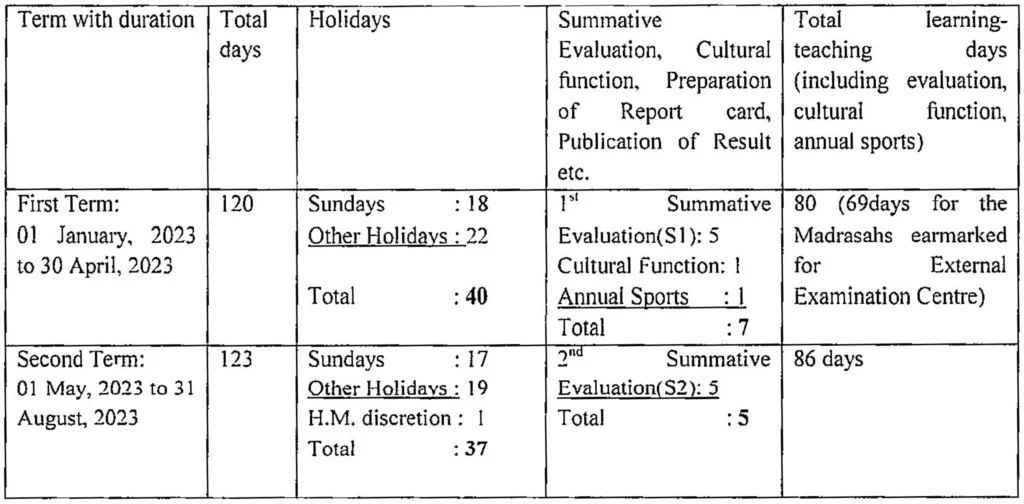
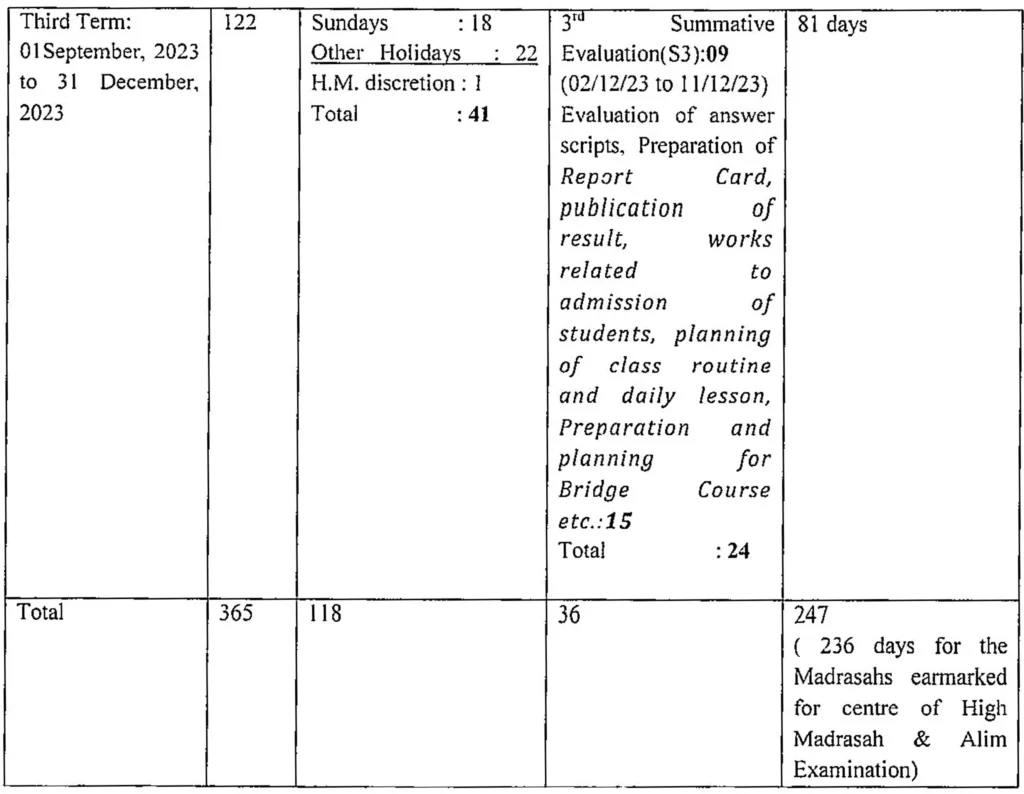
(30) Distribution of Periods:
An academic week (Monday to Saturday) shall consist of 44 periods with 40 to 35 minutes duration each. The distribution of periods per day in a week and weekly class routine for Junior High, High and Senior Madrasah will be as follows:
(a) DISTRIBUTION OF PERIODS (WITH DURATION) FROM MONDAY TO THURSDAY
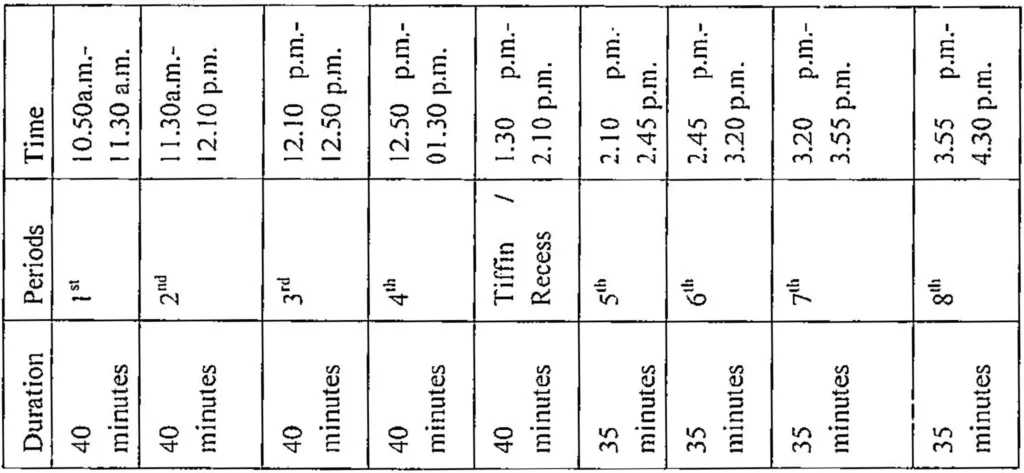
(b) DISTRIBUTION OF PERIODS (WITH DURATION) FOR FRIDAY ONLY
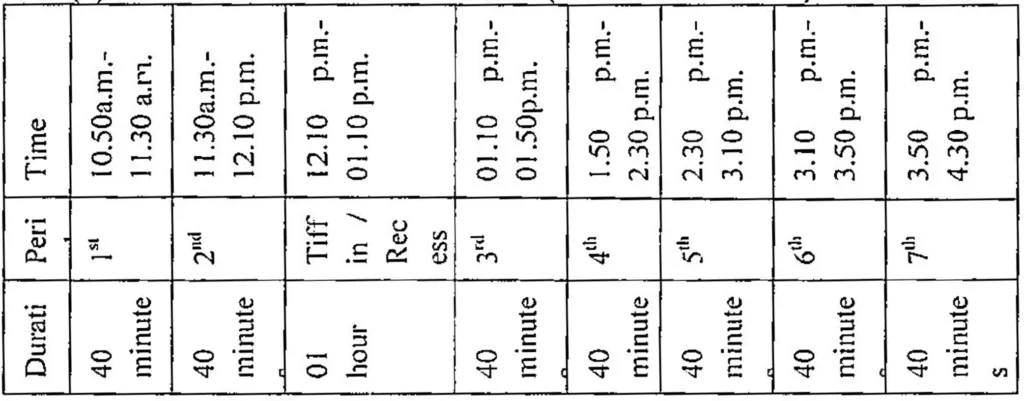
(c) DISTRIBUTION OF PERIODS (WITH DURATION) FOR SATURDAY ONLY

(d) STRUCTURE OF WEEKLY CLASS ROUTINE FOR JUNIOR HIGH AND HIGH MADRASAH
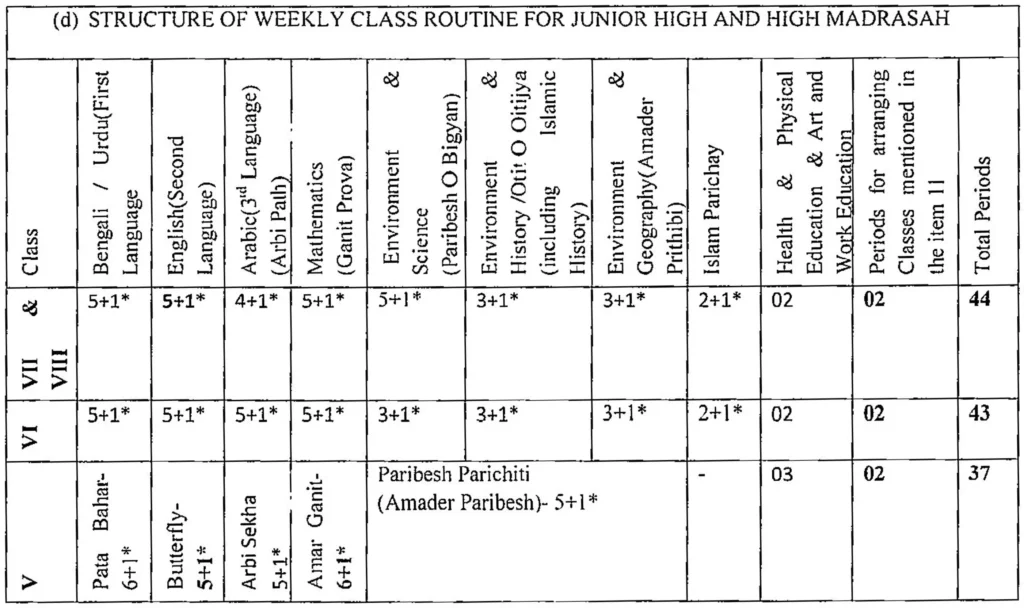
(e) WEEKLY CLASS ROUTINE FOR HIGH MADRASAH
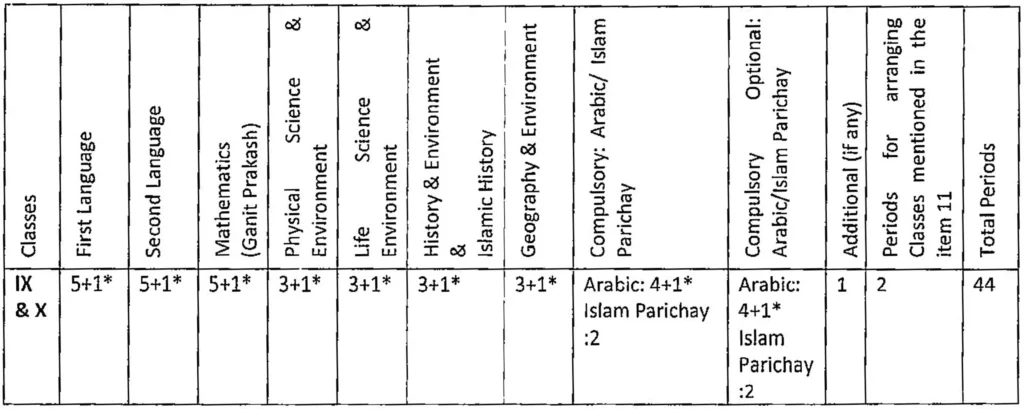
(f) WEEKLY CLASS ROUTINE FOR SENIOR MADRASAH
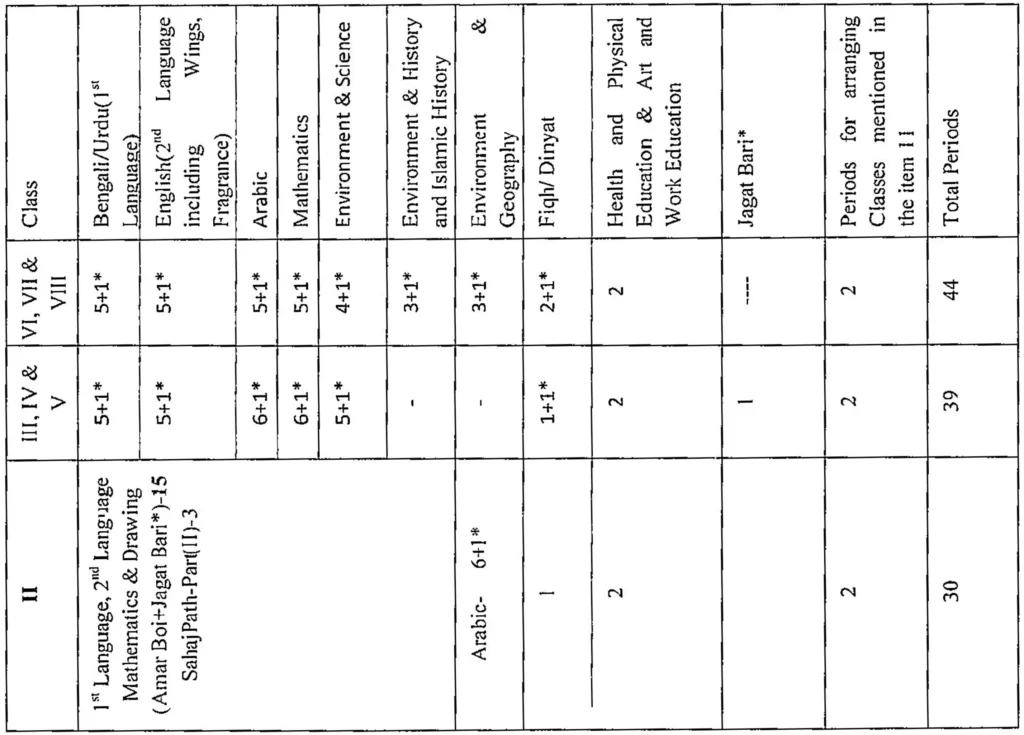

(g) WEEKLY CLASS ROUTINE FOR SENIOR MADRASAH
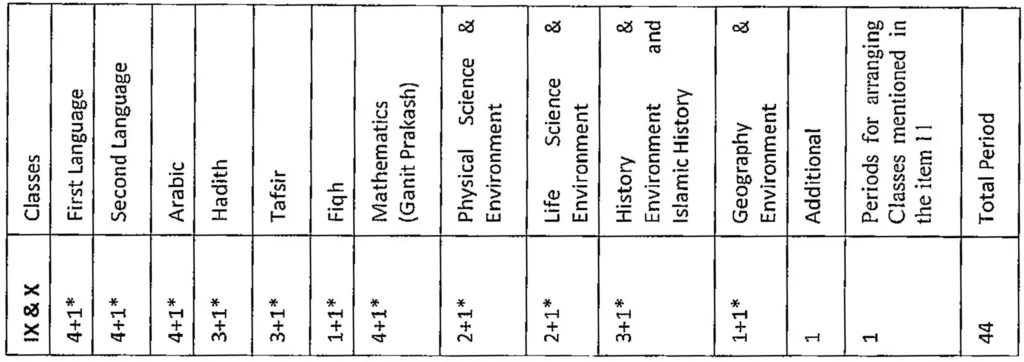
(31) Evaluation System:
The Continuous & Comprehensive Evaluation (CCE) system developed by the ‘Expert Committee’ of Government of West Bengal under school Education Department in the year 2013 with partial modification has already been adopted for all types of recognized madrasahs from the academic year 2013. The all round development of the learners will be observed and recorded continuously throughout the year through Formative (diagnostic) and Summative (judge mental) evaluation. The schedule of Summative Evaluation will be as under:

(32) AT A GLANCE
(a) Timings of Madrasah hours
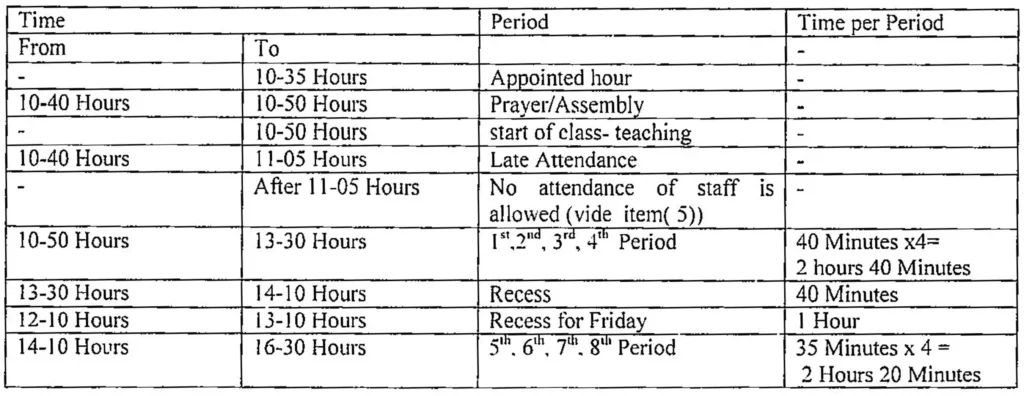
Total Madrasah hours in an academic week = 33 hours
Total Learning-Teaching hours (including recess) in an academic week = 32.5 hours
(b) Working days & working hours in the academic year
365 days
Less 52 days (Sundays)
Less 65 days (holidays)
Total Working days: 249 days i.e. 41.5 academic weeks
Total Madrasah hours in this academic year =(41.5X33) Hrs.= 1369,5 Hours
Total Learning-Teaching days (excluding Summative Evaluations and days after completion of 3rd.
Summative Evaluation): 213days i.e. 35.5 academic week
Total Learning-Teaching hours including recess (excluding Summative Evaluations and days after completion of 3rd. Summative Evaluation): =(35.5X32.5) Hrs.= 1153.75 Hours
Prayer/ assembly*
The following programme may be followed for daily assembly/ prayer:
a) assembly of students & teachers ( section wise): 1 minute
b) observance of silence: 0.5 minute
c) prayer (including National Anthem): 4 minutes
d) announcement of important daily NEWS by the student/teacher: 1 minute
e) instruction to students by HM/Superintendent/TIC/AHM: 1 minute
f) orderly dispersal in lines to respective classes following the class teacher/monitor: 2.5 minutes
(33) Supplementary to distribution of Classes:
A. The classes earmarked with asterisk (*) are assigned for assessing learning outcomes as per amendment of RTE ACT. 2009. The child’s development of learning outcomes is to be conducted through formative assessment as well as summative assessment in classes I-VIII and through internal formative evaluation(IFE) in classes IX and X as per the directives of WBBME.
B. The Madrasah authorities are directed to make necessary provisions for arranging library class, smart class/ class through K-Yan/audio-Visual learning, Computer literacy or Laboratory based learning, awareness drives ( Kanyashree, Road safety, Child rights, Disaster management. Snake bites. Child marriage. Child trafficking etc.) regarding curricular subjects as far as practicable.
C. The Madrasah authorities are directed to make necessary provisions for few classes for IX and X as regards the activities given alongside, information and communication technology (ICT), audio-visual learning, reference work, lab-activities/lab-based learning, Mock tests. Career counseling. Basic legal awareness/ Health awareness/ Skill enhancement workshops, inclusive education, financial literacy etc., as applicable. The library may be used on and often for smooth execution of 1FE in classes IX and X as well as for remedial classes.
D. Maintaining teacher’s diary for ensuring formative assessment as well as summative assessment through framing of tasks, learning evidence, class record book, child portfolio on a day-to -day basis is mandatory (for classes I-VIII) for each teacher.
E. Every Madrasah has to furnish a blue print of their routine/ daily time table pertaining to the mandatory structure of time periods/class distribution as earmarked by WBBME.
F. The Madrasahs will have to furnish a report to WBBME through e-mail (wbbmeaca@gmail.com) just after completion of 3 consecutive summative evaluations with proper evidences, highlighting the extent to which a child’s learning outcome has been achieved through preparation of child profiles. A copy of the same is also to be sent to D.I.S(SE)/A.D.I.S (SE)/A.I.S(SE) of concerned districts and sub divisions, as applicable.
G. In cases of classes I-VIII, the Madrasahs may afford time during effective instructional hour or may use some classes for the following activities (from classes other than subject-based learning) to develop and strengthen their learning abilities within and outside the classroom. The class teacher will incorporate and tag pertinent activities within her/his lesson design to be executed during the instructional hour throughout the academic year. Some of the activities that are exclusively co-curricular in nature ( e.g. web designing, awareness drive etc.) may demand allotment of separate classes, independent of lesson design but within the stipulated instructional hours.
ACTIVITIES:
- Communicative English Classes
- Computer Assisted learning (CAL)( lesson based)
- outdoor class room days/educational tour/field trip/ community mobilization/population education
- awareness drives e.g Kanyashree, Road Safety( Safe Drive, Save Life), Bullying, Child Rights,POCSO, Child trafficking. Child Marriage, Vector borne diseases with special reference to Dengue, weekly iron and folic acid supplementation, Vaccination(Rubella.Measles), Administration of deworming tablets, Cyber Crime, Disaster Management, Rain water harvesting, Planting trees, Prevention of pollution, Snake bite. Eradication of Superstitions, wild life conservation, Sanitation, etc.
- Provision for safe drinking water
- music classes (wherever applicable)
- play (drama) /puppetry workshops( lesson based)
- health and hygiene camps for health awareness advocacy programmes
- group activities (an activity bank should be prepared at the Madrasah level)
- summer/winter camps
- life skill based activities
- counseling
- value inculcation
- adolescent education
- rock climbing
- global positioning system and weather forecast
- visual arts
- news editing
- content writing
- web designing
- artificial intelligence and machine learning
- preparing museum in Madrasahs based on local resources
- language Laboratory
- Math Laboratory
- Hands on experiment and basic laboratory exposure
- Kitchen gardening
- Financial literacy
- Recycling of solid waste
- Mock parliament
- Exposure visit to different fairs( e.g. mathematics fair, science fair, health fair), museum entrepreneur centres and Govt. offices.
- Self defence
- Care of geriatric people and awareness about their rights.
- Child guidance clinic for differently abled children
- innovative writing workshops; etc. as the need arises, to ensure a child’s social, mental and physical well being and help achieve her/his holistic development and other contemporary interventions, as and when directed bv the competent authority.
Sd/- Secretary
West Bengal Board of Madrasah Education